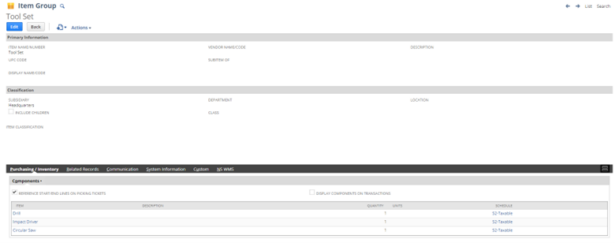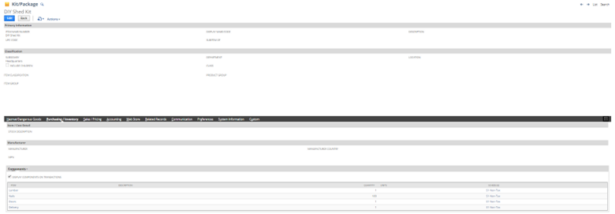NetSuite’s inventory capabilities feature various individual inventory item types, such as serialized inventory and non-inventory for resale. Often, multiple items are sold together in a bundle. This is where NetSuite’s matrix, group, and kit items come into play. While they all sound similar, how can you determine which item type fits your inventory needs?
What are Matrix items?
Matrix items are used when there are multiple options for the same product. An example would be different colorways to choose from for the same welding helmet model or different rebar lengths. This type of item allows multiple options to fall under one “parent” item. A parent item is the overarching item in the matrix setup – referring to the prior example, this would be the welding helmet. Within each parent item record, you will find multiple child items containing multiple options for the parent item. This could be related to different product options, such as colors, designs, and sizes. A key point is that NetSuite can handle a maximum of 2000 matrix options for a single item (NetSuite Applications Online Help).
What are Group Items?
Group item type is typically used when a bundle of items is sold together. As it contains multiple individual items, each item will be listed on the purchase or sales order under the group name (NetSuite Applications Online Help). An example could be a bundle for power tools such as a drill, impact driver, and circular saw. The total price of the group would reflect each individual item price. Components of group items can not only contain inventory and non-inventory items, but they could also include service items such as an installation fee. Group items also allow changes to an individual item component where necessary, including price, quantity, or even customer-specific price groups (NetSuite Applications Online Help).

What are Kit items?
Kit items are also a bundle of items like group items; however, the structure of kit items differs from that of groups. As the name suggests, kit items are a collection of individually sold items offered at a packaged price. An example would be a DIY shed kit containing parts such as lumber, nails, doors, and delivery, all for a set price. Contrary to group items, it is important to note that kit items revenue reflects the sale of the entire kit, not the individual components (NetSuite Applications Online Help). Additionally, kit item components cannot be individually altered on the line level. However, different price levels can be assigned.

What are the key takeaways when selecting between items options?
| Matrix | Group | Kit |
| Ideal for an items that has multiple product options such as size, design, color, etc. | Item components within the group are editable. The total cost of the item group is the sum of each individual component item. | Item components are non-editable; however, various price levels can be set. All kinds of individual item types can be used as a kit item component. |
Additional Item Type: Assembly Items
Assembly items are unique to work orders and uses the manufacturing capability in NetSuite. Like matrix, group, and kit items, assembly items also contain multiple inventory item components. These item components can be lot numbered, serialized, or simply inventory items. The difference is that assembly items typically comprise of raw materials or parts stocked to create finished goods in a bill of materials. Raw materials and assembled items can be tracked individually throughout the process. Typical assembly items can include ingredients needed to create cement mix as the final product or multiple parts to create a piece of equipment.

Interested in Learning More About NetSuite Inventory Capabilities?
NetSuite offers a wide variety of functionality and custom possibilities. Our team at RSM can help your business leverage the system’s capabilities with our industry and NetSuite expertise! Schedule a demo with our team today to see how NetSuite can best fit your business needs.
Link to request form: https://rsmus.com/technologies/netsuite/industries/manufacturing-and-wholesale-distribution.html
If you have any questions or comments, please reach out to us here.

 RSMUS.com
RSMUS.com



